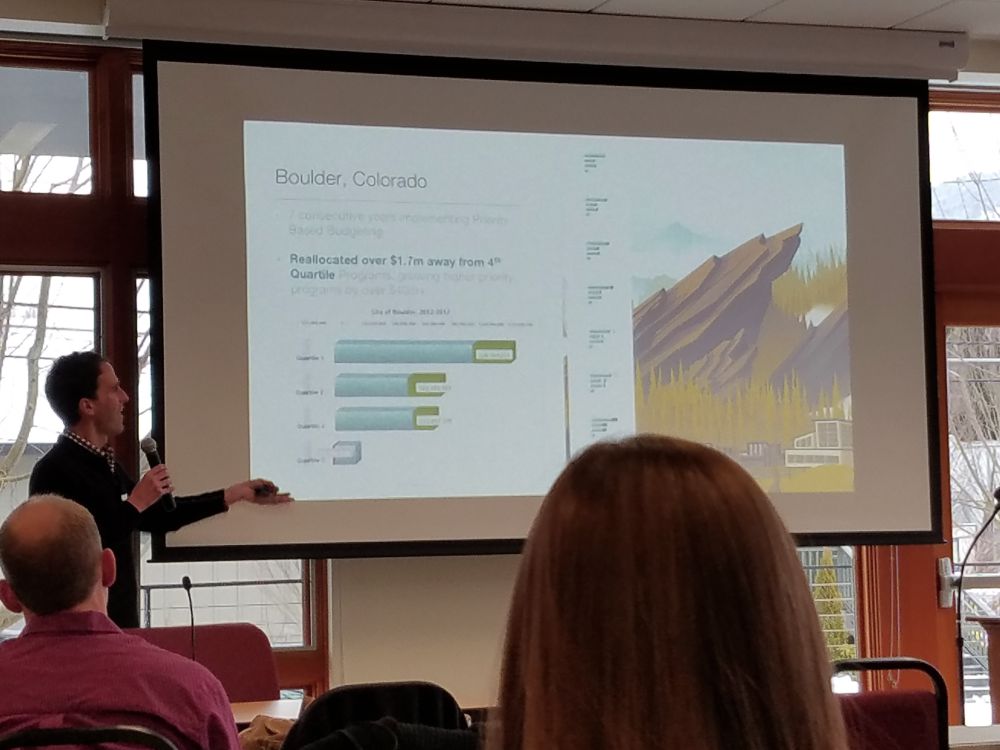Connecting state and local government leaders
“Every program is scored by mandate, reliance, recovery cost, demand and population served. And this is where policy questions come to life.”
SNOQUALMIE, Wash. — While observing a recent workshop focused on priority-based budgeting in local governments in this picturesque city near Seattle earlier this month, I couldn’t help think back to a moment in mid-November at the Pittsburgh International Airport. While waiting for delayed luggage to show up, I ended up chatting with a middle-aged woman near a baggage carousel.
After some small talk to pass the time, she asked me about my job, and her face soured somewhat when I told her that I manage a publication that examines state and local government management, technology and innovation.
“There’s nothing but waste in government,” she responded gruffly. Across the board, she continued, governments “don’t know how to prioritize things.”
I told her, politely, that her declaration painted with too broad a brush stroke, which she admitted. The interaction, however, highlighted the anti-government mood that intensified during the 2016 presidential race and the ongoing challenges that the public sector faces in this day and age.
It would have been great for the woman from the Pittsburgh airport ,who said that governments don’t know how to prioritize things, to have observed the Priority-Based Budgeting Northwest Summit hosted by the Government Performance Consortium, Denver-based ResourceX and the city of Snoqualmie on Feb. 7. It would have likely reshaped her outlook on the ability of governments to put priorities front and center of one of their core tasks: budgeting.
Simply put, priority-based budgeting is a way to align budget practices with a government’s defined priorities. Putting priorities first may seem like a no-brainer, but local government budgeting, as any municipal leader can tell you, can be a complicated task.
“The ideas make so much sense. Everyone understands that priority-based budgeting is a good thing. But it’s not easy to implement,” Chris Fabian, co-founder of ResourceX and the Center for Priority-Based Budgeting, told the gathering in Snoqualmie City Council chambers. “It’s tough.”
Priority-based budgeting is currently used in 150 governments in the U.S. and Canada and is recognized as a leading practice for local governments by the International City/County Management Association. It’s something used in both more conservative communities, like Washington County, Wisconsin, and progressive ones, like Boulder, Colorado. It’s worked for smaller jurisdictions, like Idaho Falls, Idaho, and larger ones as well, including places like Cincinnati and San Jose.
The ongoing challenge for advocates of priority-based budgeting, Fabian said: “How do we make this process easier?”
At the core of priority-based budgeting is the process of inventorying every functionality of a particular government and scoring each one against a set of an agreed-upon priorities. In Washington County, Wisconsin, for instance, the priorities have included a safe and secure community, economic growth and vitality, effective mobility and reliable infrastructure, and access to basic physical, behavioral and socio-economic needs.
“Every program is scored by mandate, reliance, recovery cost, demand and population served. And this is where policy questions come to life,” Fabian said.
Advocates of priority-based budgeting stress that their approach isn’t a shortcut to budget slashing. “The goal isn’t always cut the program,” Fabian said. “The goal is can we find a better way to do it.”
That might mean having a government partner with another jurisdiction or other local stakeholder to provide a certain service.

In Boulder, for instance, it helped city leaders reduce costs from a popular free yoga program by partnering with other organizations to offer the activity.
The inventorying and scoring process, which can include a peer-review process, requires a lot of work up front. Typically, the program scoring exercise takes around three weeks to complete, and peer review takes an additional three weeks to finish. “It drives the conversation around the data that you have,” Fabian said.
“The scoring is a ton of work,” Robert Karlinsey, the city manager in Kenmore, Washington, told the gathering. But he noted that “it actually can be a fun process.”
His Seattle-area jurisdiction, home to around 20,000 residents, has used priority-based budgeting for two biennial budget cycles.
Before using the budget approach, “I knew where we were spending money, but we didn’t know where we were spending our time,” he told the group. The insights gained through priority-based budgeting have been “enlightening but anti-climactic at the same time.”
Karlinsey said that some municipal employees might feel that it’s an academic exercise that doesn’t have tangible impacts, but for decisionmakers, priority-based budgeting can provide many insights into their operations and how they’re allocating resources.
“It does help us look at the budget through a new lens,” he said.
There’s no one-size, fits-all approach to implementing priority-based budgeting, which is why it’s important for jurisdictions to compare notes and learn together as “communities of practice,” according to Larisa Benson, an adviser with the Government Performance Consortium, which is part of the non-profit Municipal Research and Services Center in Washington state.
“Though we’re all very much the same, each path is a little bit different,” she said.
WATCH: An Overview of Priority-Based Budgeting: Crete, Nebraska
Michael Grass is Executive Editor of Government Executive’s Route Fifty and is based in Seattle.

NEXT STORY: A New Path to Authorize an Income Tax in Washington State May Start in Seattle




